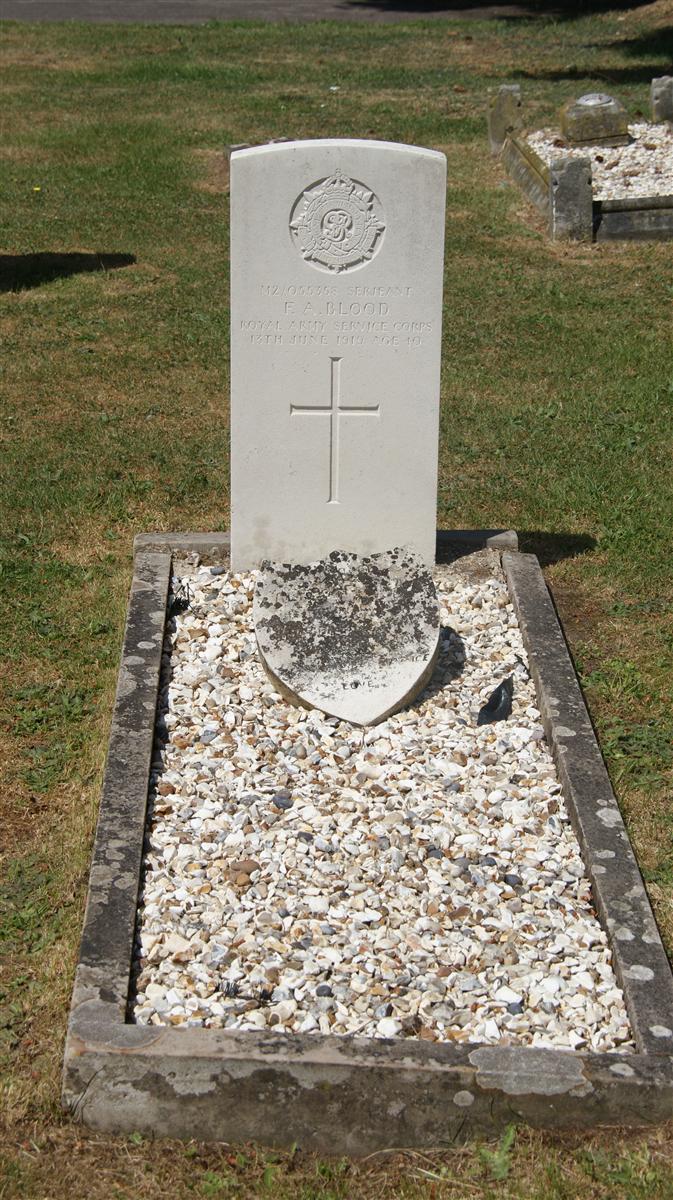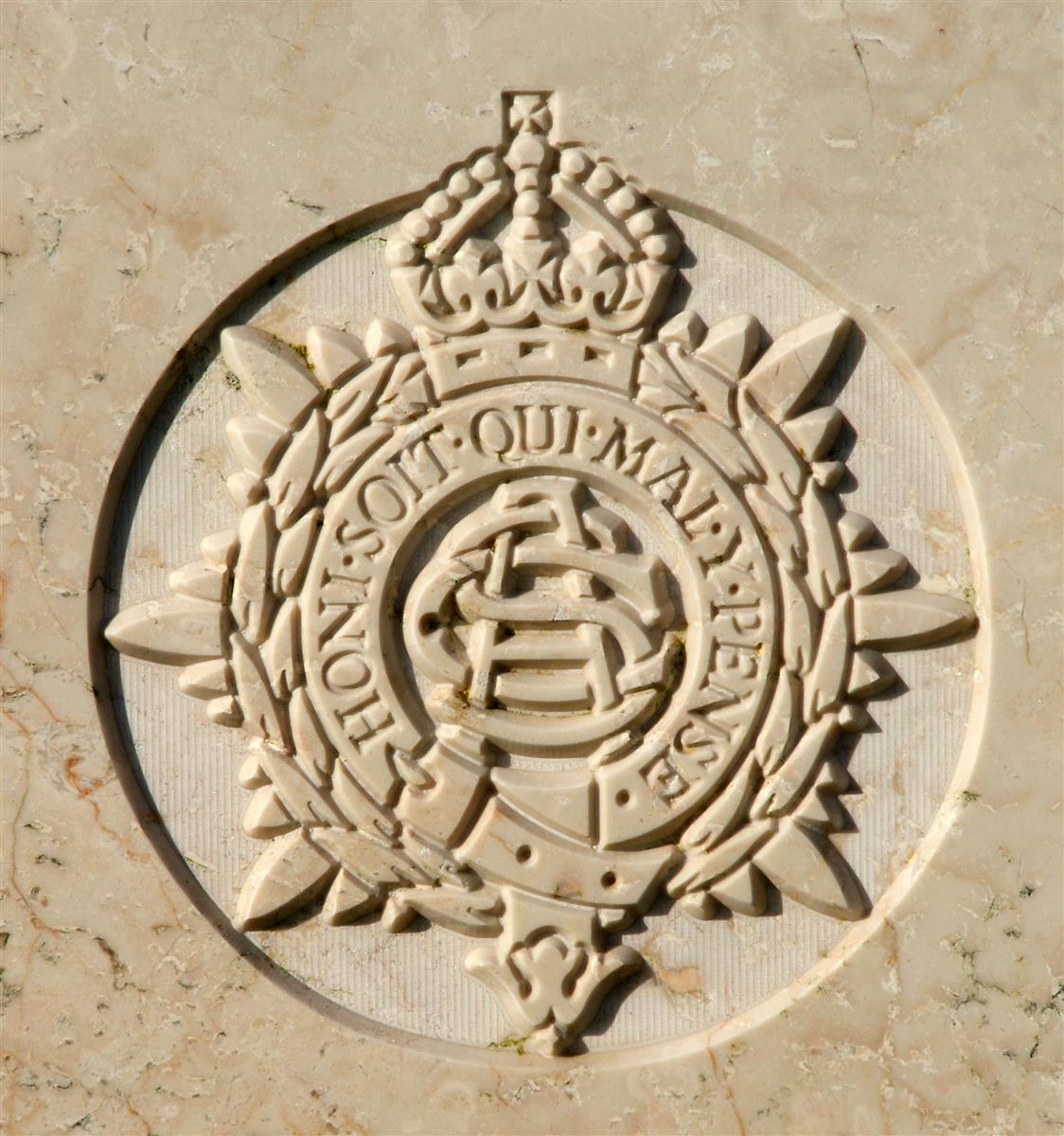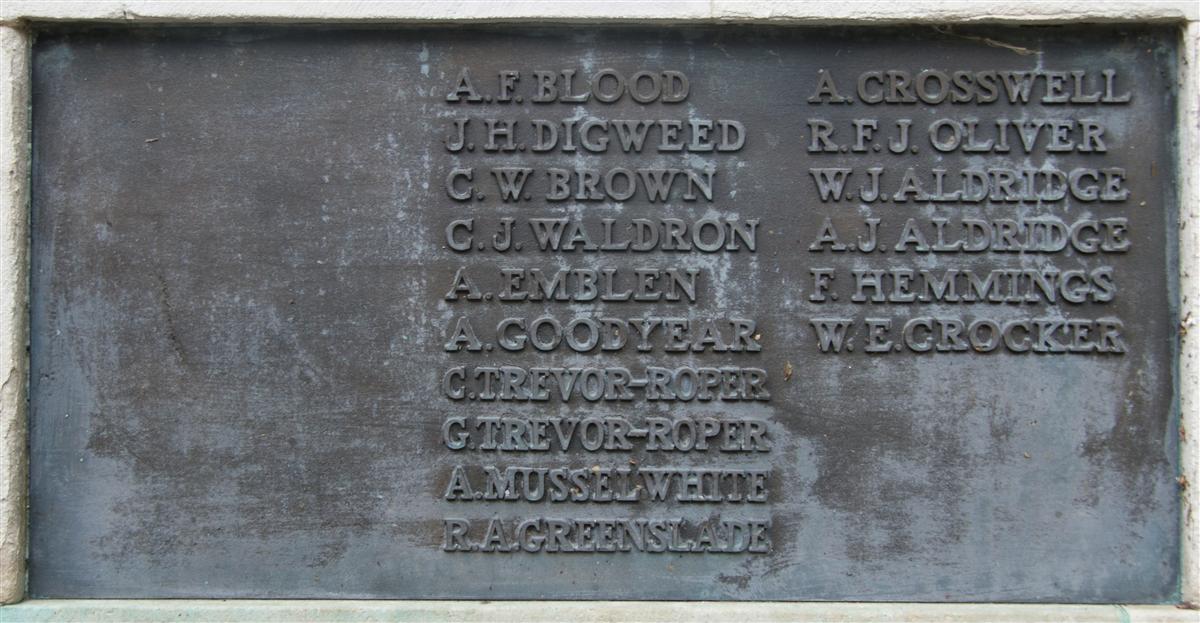Frank Austin Blood
Serjeant M2/05535B Frank Austin Blood, Royal Army Service Corps (Motor Transport).

Frank's grave in Shaw Cemetery, shared by his wife Alice. The CWGC headstone was added after the original inscription became illegible. |
Frank was born on 6 October 1878 in Burton on Trent, the eldest son of Robert Chadd Blood and his wife Lydia Florence née Parr. Robert was a land surveyor and raised his family of four children (Lydia, Frank, Mabel and Philip) at 6 Shobnall Street in Burton.
Many of the stories on this website tell the tales of young men facing the great adventure of war, volunteering to serve their country in a spate of patriotic fervour. Frank was older than these young lads, the great adventure of his time was the South African War 1901-1902 also known as the Second Boer War. Like the young lads of 1914 Frank volunteered to serve his country and made the long voyage to South Africa as Private 20735 in the 35th Company Imperial Yeomanry. The Imperial Yeomanry were formed from volunteers from county yeomanry units. The 35th Company came out of the Middlesex Yeomanry, a strange location for Frank whose roots were in Staffordshire; presumably he had moved to London or nearby, perhaps while training for his future career as an electrical engineer.
His enlistment papers show he was unusually tall for the time, 6ft 2in and thin (135lbs) with blue eyes and brown hair.
His service in South Africa was cut short after 141 days when, on 18 September 1901 he was declared ‘inefficient’. Despite his short service he saw plenty of the country as evidenced by the award of clasps to his Queen's South Africa Medal for Cape Colony, Orange Free State and Transvaal, as well as South Africa 1901. He returned to England and civilian life
On 27 September 1904 Frank married Alice Flora Cristall at Folkestone in Kent. Alice was born in Croydon but had been resident in Folkestone for some years.
Following his time in South Africa he appears to have re-enlisted into the Derbyshire Yeomanry, much closer to home. It is doubtful that he remained with them for long as he would have been unable to fulfil any militia commitments as he followed a peripatetic career. He and his growing family moved around the country, presumably following his work. Some of their stops can be seen from the birthplaces of their children. Mabel Thelma was born in Rugby on 14 July 1905, Violet Ethel in Burton on Trent on 16 July 1906, Alice Ena in Willesden on 26 October 1907, Bindon Cristall in London on 25 January 1909, Robert Harry on 7 July 1911 and Florence May on 24 May 1914 (both in Sale, Cheshire). Sadly May died aged only one, when the family were living in Lisgard, also in Cheshire.
By August 1914 Frank's patriotic fervour had not diminished and he was as keen to serve as any young lad. He had became a member of the National Reserve, the body that, when the war began, was tasked with guarding strategic facilities like railways and bridges, as well as providing guards for internment and prisoner of war camps. Most members were, like Frank, old soldiers; many were unfit for duty at the front, though the fitter members were transferred to field service units in 1915.
However, guarding railways was not for Frank – he wanted to do more and so he signed up for the cavalry reserve (6th Dragoon Guards) on 25 August 1914, only three weeks after war was declared. His service was short, he was discharged on 19 October as ‘not likely to become an efficient soldier’. On this occasion it appears that his inefficiency was related to his lack of teeth – he had eight, only one of which was in his upper jaw.

The regimental badge of the Army Service Corps, as used on CWGC headstones. |
His career with the army had its ups and downs as he rose rapidly to Corporal in May 1915 only to be reduced to the ranks in September for ‘absence’ . A little over eight months after this demotion, on 9 May 1916 his youngest child, Dorothy, was born in Newbury; perhaps he took some unofficial ‘leave’ to help the family move south? Frank then rises again, to corporal on 10 January 1916 (acting and unpaid). Back to private again on 29 January when he is transferred to another unit. Then corporal in February (paid this time) and acting sergeant (unpaid) in March before settling as a sergeant (paid) on 27 April 1916. This last promotion came 16 days after he landed in France to begin his service as a small cog in the vast Service Corps operation that supplied hundreds of thousands of troops with materiel and supplies all along the Western Front.
Despite his declaration that he was a ‘motor driver’ and his trade as an electrical engineer he served as a road sergeant. It is not clear what this job comprised, though the rank was used in the old East India Company Army for a sergeant supervising a road maintenance crew. This could have been Frank’s role – he rarely spent more than a couple of months with any particular MT Company suggesting that his work was in demand but was, perhaps, not a core role of a normal company. However, almost all of his postings were to companies supporting the Siege Artillery (operating the heaviest guns in use on the front). Moving such guns would have been a specialist role that may well have been supervised by a ‘road sergeant’; perhaps he was attached to specific guns that were moved around the front to meet the immediate needs of the fighting. This would be an explantion of how he came to serve in so many companies, all in different Corps. Another theory is that he was responsible for monitoring the roads that the siege guns would be transported over and ensuring that they were fit to carry the extremely heavy loads associated with the siege guns. He may have been covering a particular area and would transfer to whichever siege park was in that area at the time.
After the war ended Frank was discharged from the army on 28 April 1919 and returned to his family in Newbury. Less than two months later on 13 June he died in Newbury Hospital of at the Newbury District Hospital of myocarditis and dilation of heart. Myocarditis is an inflammation of the heart that is usually caused by a virus. It may well be that Frank was a victim of the influenza epidemic that killed so many in 1918-19. He was 40 years old. Despite the fact that Frank was discharged some weeks before he died the War Office accepted that his death was related to his service, suggesting that the viral infection was contracted while he was still in uniform and may even have accelerated his discharge. His widow, Alice, was awarded a small pension

Frank's name on Newbury War Memorial (top centre) |
He was buried in Shaw Cemetery in grave 2178, the shield shaped tablet on the family grave has lost legibility over time so the Commonwealth War Graves Commission has added one of their familiar headstones to ensure that Frank is remembered.
His family stayed in Newbury, most of his children married locals and lived out their lives in the area, the wanderings of their childhood a thing of the past.
Frank is remembered locally on panel 8 of the Newbury Town War Memorial (as A F Blood), the Memorial Board and Roll of Honour in St Nicolas Church as well as on his grave in Shaw Cemetery.

Find a memorial :
| Died this day: | |
| 02 March 1918 | |
| N G Burgess | |
| Newbury |

Like this site? Show your appreciation through a donation to a great charity.